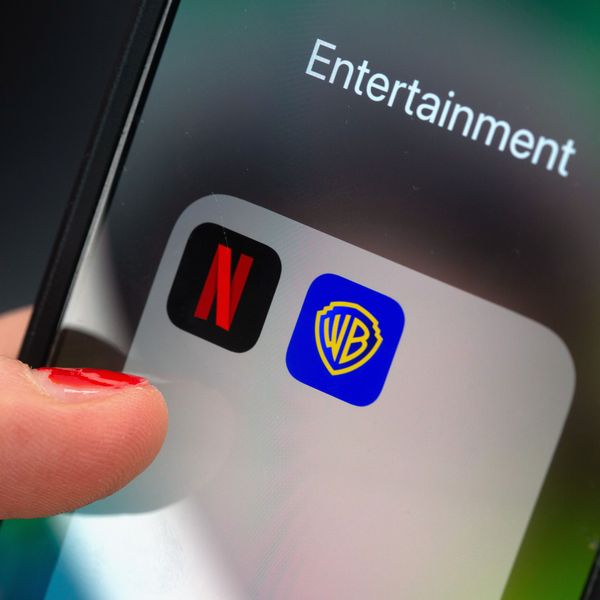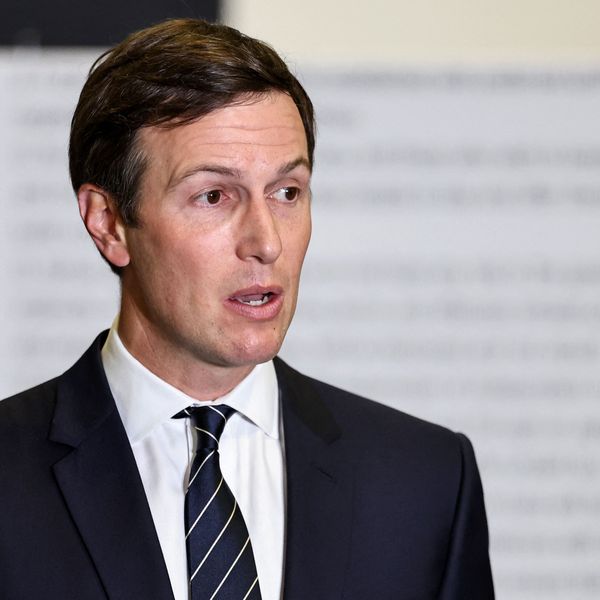Critics of AT&T/DirecTV Deal: 'Slay the Mega-Mergers'
'The rush is on for some of the biggest industry players to get even bigger, with consumers left on the losing end.'
Sunday's official announcement that telecom giant AT&T has offered to purchase the satellite television company DirecTV for nearly $50 billion--the latest in a series of high-profile industry "mega-mergers"--has spurred consumer advocates to demand lawmakers and regulators at the Federal Communications Commission strike down the deal.
"These companies don't care about providing better services or even connecting more Americans. It's about eliminating the last shred of competition in a communications sector that's already dominated by too few players." --Craig Aaron, Free Press
" FCC Chairman Tom Wheeler--who has stated his mantra is competition, competition, competition--has the power to block these wasteful and anti-competitive deals. And he should use it," said Craig Aaron, president of Free Press, in a statement.
According to Reuters:
The combination with DirecTV, the No.1 U.S. satellite TV provider with 20 million customers, would beef up Dallas-based AT&T's packages of cellular, broadband, TV and fixed-line phone services.
For DirecTV, the deal will enable it to offer broadband Internet for the first time to its U.S. customers, filling in a gap that had made the company vulnerable to cable rivals, which can provide Internet service through their networks.
"It gives us the parts to fulfill a vision we have had for a couple of years, that is, the opportunity and the ability to take premium content and deliver premium content over multiple points for the customer, whether it be through a smartphone, through a tablet, or television or laptop," said AT&T CEO Randall Stephenson, speaking on a conference call.
But for critics, the merger speaks to the increasing consolidation of the nation's media market at a time when the quality of services is going down while corporate profits are going up.
"AT&T's takeover of DirecTV is just the latest attempt at consolidation in a marketplace where consumers are already saddled with lousy service and price hikes," said the Consumers Union's Delara Derakhshani in an emailed statement. "The rush is on for some of the biggest industry players to get even bigger, with consumers left on the losing end."
And as Aaron adds, "These takeovers are expensive, and consumers end up footing the bill for merger mania. AT&T is paying $48.5 billion and taking on an additional $19 billion in debt to buy DirecTV. That's a fortune to spend on a satellite-only company at a time when the pay-TV industry is stagnating and broadband is growing.
"For the amount of money and debt AT&T and Comcast are collectively shelling out for their respective mega-deals, they could deploy super-fast gigabit-fiber broadband service to every single home in America," Aaron continued. "But these companies don't care about providing better services or even connecting more Americans. It's about eliminating the last shred of competition in a communications sector that's already dominated by too few players."
Last month, cable giant Comcast, the nation's largest cable provider, announced its intention to purchase Time Warner Cable, the nation's second-largest provider. That deal also received widespread condemnation from critics but is still making its way through the approval process.
And as Derakhshani points out, "You can't justify AT&T buying DirecTV by pointing at Comcast's grab for Time Warner, because neither one is a good deal for consumers."
An Urgent Message From Our Co-Founder
Dear Common Dreams reader, The U.S. is on a fast track to authoritarianism like nothing I've ever seen. Meanwhile, corporate news outlets are utterly capitulating to Trump, twisting their coverage to avoid drawing his ire while lining up to stuff cash in his pockets. That's why I believe that Common Dreams is doing the best and most consequential reporting that we've ever done. Our small but mighty team is a progressive reporting powerhouse, covering the news every day that the corporate media never will. Our mission has always been simple: To inform. To inspire. And to ignite change for the common good. Now here's the key piece that I want all our readers to understand: None of this would be possible without your financial support. That's not just some fundraising cliche. It's the absolute and literal truth. We don't accept corporate advertising and never will. We don't have a paywall because we don't think people should be blocked from critical news based on their ability to pay. Everything we do is funded by the donations of readers like you. Will you donate now to help power the nonprofit, independent reporting of Common Dreams? Thank you for being a vital member of our community. Together, we can keep independent journalism alive when it’s needed most. - Craig Brown, Co-founder |
Sunday's official announcement that telecom giant AT&T has offered to purchase the satellite television company DirecTV for nearly $50 billion--the latest in a series of high-profile industry "mega-mergers"--has spurred consumer advocates to demand lawmakers and regulators at the Federal Communications Commission strike down the deal.
"These companies don't care about providing better services or even connecting more Americans. It's about eliminating the last shred of competition in a communications sector that's already dominated by too few players." --Craig Aaron, Free Press
" FCC Chairman Tom Wheeler--who has stated his mantra is competition, competition, competition--has the power to block these wasteful and anti-competitive deals. And he should use it," said Craig Aaron, president of Free Press, in a statement.
According to Reuters:
The combination with DirecTV, the No.1 U.S. satellite TV provider with 20 million customers, would beef up Dallas-based AT&T's packages of cellular, broadband, TV and fixed-line phone services.
For DirecTV, the deal will enable it to offer broadband Internet for the first time to its U.S. customers, filling in a gap that had made the company vulnerable to cable rivals, which can provide Internet service through their networks.
"It gives us the parts to fulfill a vision we have had for a couple of years, that is, the opportunity and the ability to take premium content and deliver premium content over multiple points for the customer, whether it be through a smartphone, through a tablet, or television or laptop," said AT&T CEO Randall Stephenson, speaking on a conference call.
But for critics, the merger speaks to the increasing consolidation of the nation's media market at a time when the quality of services is going down while corporate profits are going up.
"AT&T's takeover of DirecTV is just the latest attempt at consolidation in a marketplace where consumers are already saddled with lousy service and price hikes," said the Consumers Union's Delara Derakhshani in an emailed statement. "The rush is on for some of the biggest industry players to get even bigger, with consumers left on the losing end."
And as Aaron adds, "These takeovers are expensive, and consumers end up footing the bill for merger mania. AT&T is paying $48.5 billion and taking on an additional $19 billion in debt to buy DirecTV. That's a fortune to spend on a satellite-only company at a time when the pay-TV industry is stagnating and broadband is growing.
"For the amount of money and debt AT&T and Comcast are collectively shelling out for their respective mega-deals, they could deploy super-fast gigabit-fiber broadband service to every single home in America," Aaron continued. "But these companies don't care about providing better services or even connecting more Americans. It's about eliminating the last shred of competition in a communications sector that's already dominated by too few players."
Last month, cable giant Comcast, the nation's largest cable provider, announced its intention to purchase Time Warner Cable, the nation's second-largest provider. That deal also received widespread condemnation from critics but is still making its way through the approval process.
And as Derakhshani points out, "You can't justify AT&T buying DirecTV by pointing at Comcast's grab for Time Warner, because neither one is a good deal for consumers."
Sunday's official announcement that telecom giant AT&T has offered to purchase the satellite television company DirecTV for nearly $50 billion--the latest in a series of high-profile industry "mega-mergers"--has spurred consumer advocates to demand lawmakers and regulators at the Federal Communications Commission strike down the deal.
"These companies don't care about providing better services or even connecting more Americans. It's about eliminating the last shred of competition in a communications sector that's already dominated by too few players." --Craig Aaron, Free Press
" FCC Chairman Tom Wheeler--who has stated his mantra is competition, competition, competition--has the power to block these wasteful and anti-competitive deals. And he should use it," said Craig Aaron, president of Free Press, in a statement.
According to Reuters:
The combination with DirecTV, the No.1 U.S. satellite TV provider with 20 million customers, would beef up Dallas-based AT&T's packages of cellular, broadband, TV and fixed-line phone services.
For DirecTV, the deal will enable it to offer broadband Internet for the first time to its U.S. customers, filling in a gap that had made the company vulnerable to cable rivals, which can provide Internet service through their networks.
"It gives us the parts to fulfill a vision we have had for a couple of years, that is, the opportunity and the ability to take premium content and deliver premium content over multiple points for the customer, whether it be through a smartphone, through a tablet, or television or laptop," said AT&T CEO Randall Stephenson, speaking on a conference call.
But for critics, the merger speaks to the increasing consolidation of the nation's media market at a time when the quality of services is going down while corporate profits are going up.
"AT&T's takeover of DirecTV is just the latest attempt at consolidation in a marketplace where consumers are already saddled with lousy service and price hikes," said the Consumers Union's Delara Derakhshani in an emailed statement. "The rush is on for some of the biggest industry players to get even bigger, with consumers left on the losing end."
And as Aaron adds, "These takeovers are expensive, and consumers end up footing the bill for merger mania. AT&T is paying $48.5 billion and taking on an additional $19 billion in debt to buy DirecTV. That's a fortune to spend on a satellite-only company at a time when the pay-TV industry is stagnating and broadband is growing.
"For the amount of money and debt AT&T and Comcast are collectively shelling out for their respective mega-deals, they could deploy super-fast gigabit-fiber broadband service to every single home in America," Aaron continued. "But these companies don't care about providing better services or even connecting more Americans. It's about eliminating the last shred of competition in a communications sector that's already dominated by too few players."
Last month, cable giant Comcast, the nation's largest cable provider, announced its intention to purchase Time Warner Cable, the nation's second-largest provider. That deal also received widespread condemnation from critics but is still making its way through the approval process.
And as Derakhshani points out, "You can't justify AT&T buying DirecTV by pointing at Comcast's grab for Time Warner, because neither one is a good deal for consumers."

